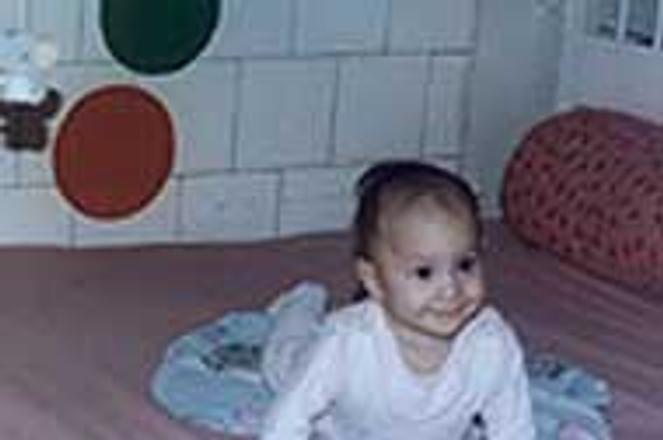Adoption experts estimate that 80% of children up for adoption in Slovakia come from Roma families.photo. Soňa Bellušová
The economic and social plight of Slovakia's Roma population has made international headlines over the past two years, as pictures of Romany asylum seekers lining up at western European borders have caught the imagination of the public.
While many Slovak and western officials have doubted the validity of the Roma's asylum demands, even obscure social statistics show that Romanies live in a far different social environment than their non-Roma compatriots.
Some of the most revealing data concern 'osvojenie' orphans - children put up for adoption after being taken from their biological parents by social workers who have decided that the parents are not adequately providing for, and therefore lose all legal rights to, their children.
According to the Ministry of Family Affairs, 2,370 such orphans were put up for adoption last year in Slovakia. Valéria Popeláková, director of a downtown Bratislava office of the Labour Ministry's Centre for Counselling and Psychological Services, estimated that more than 80% of these orphans came from Romany families.
"Sometimes the Roma families don't send their children to school, buy clothes for them, or even feed them," Popeláková said. "Many of these children are illiterate and have been abused."
Such claims, say the Roma, are common among Slovaks. Roma, they say, are accused of bearing many children in order to collect state child benefits, which goes hand in hand with the belief that Roma parents do not adequately provide for their children once they are born.
Edmund Muller, the director of the Central European Romany Education and Opportunity Centre in Košice, said that it was simply in the blood of Romanies to raise large families. He added that the economic conditions under which almost all Romany must live is also to blame for the poor environments in which Roma children are brought up.
"The problem is both economic and cultural," Muller said. "We are from India, we have a different culture. If a mother duck has six ducklings, maybe only four survive. It's like that in poor communities - families want to have more children because some will be well and some may not. But if the economic situation improves for us, Roma will have smaller families."
Stereotypes?
With unemployment nearing 100% in some Romany villages, social benefits are the only monthly income many Romany families have. According to the 1999 Institute for Public Affairs (IVO) Yearly Report on Slovakia, the state provided needy families with 1,350 crowns per month for every child under six years of age, 1,660 crowns per month for every child aged six to fifteen, and 1,770 crowns per month for every dependent child aged 16 and above as of July 1, 1998.
In total, the state paid out 15.5 billion Slovak crowns in social benefits in 1998, 63% of which was spent on children's benefits.
Many of these hand-outs do indeed go to Roma families, which have a birth rate well above the rest of the population. The IVO study showed that non-Romanies in Slovakia had an average of 1.51 children per family, compared to 4.2 children per Romany family. Although the Roma currently represent only about 7 to 8% of the country's total population, if current birth-rates continue apace, the IVO study predicted, the Roma would outnumber non-Roma Slovak inhabitants by the year 2060.
But Gregory Fabian, a consultant for the International Helsinki Federation for Human Rights, balked at the Slovak belief that Roma families have babies to increase the money they collect from the state. "People want to take care of their families," he said. "The stereotype that they have babies just for the social benefits is unfair."
Muller agreed. "Romany women love and defend their children. Sometimes, though, a mother has 10 children and it's too much, so she gives two of them to an orphanage. But people can't say that we have large families just for the benefits because there are also Slovak families with 10 children. It's not just us."
Slovaks not ready
Popeláková said that couples from Belgium, Italy, Canada and the Netherlands have so far adopted Slovak children in 1999, and that they usually had no objections to adopting a Romany child. These foreigners, she said, have had different experiences with Romanies than Slovaks.
"Slovak society is not developed enough for parents to adopt a Romany baby, although such situations have occurred," Popeláková said. "Many Slovaks have had bad experiences with 'Gypsies'."
But the lingering prejudice Slovaks hold against the Roma, a prejudice Popeláková said had worsened under the former communist regime, is not likely to be erased soon.
"It was a mistake of communism to try to assimilate the Roma with Slovak citizens," she said. "[The Roma] culture is just too different from ours."
The Helsinki Federation's Fabian, meanwhile, said that the situation could only be remedied by giving the Roma better economic opportunities. For that to happen, he added, any lingering prejudice must be abandoned and the Slovak majority must help the Roma minority.
"The economic situation is a difficult one for the Romanies," he said. "They don't have enough money to raise their children. The majority should help the Roma minority overcome their problems. The Romanies have responsibilities as well, but all too often the onus is left only to them."


